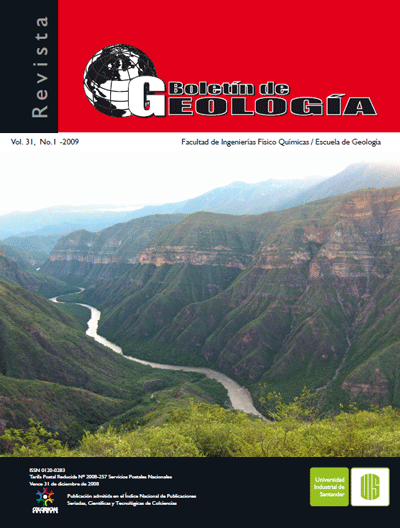ESTATUS EPISTEMOLÓGICO DEL PRINCIPIO DE UNIFORMISMO EN GEOLOGÍA, DESDE LA TEORÍA DEL CONOCIMIENTO DEL FILÓSOFO KARL R. POPPER
Published 2009-07-31
How to Cite
Abstract
Since its inception, the geological uniformitarianism of Hutton and Lyell has been considered an epistemologically problematic and confusing inductive concept. Most of the criticism and attempts at clarification have proved contradictory and vague, because they also have been made from an inductive approach. Based on certain statements of its proponents, on the ideas of the philosopher K. R. Popper about the unsustainability of logical induction, and on three case studies, this paper attempts to show that the epistemological problems arise precisely from taking the uniformitarianism as inductive and trying to solve their problems from this approach. It then proposes a solution which releases the uniformity principle of any inductive features showing, according to Popper, that it is only a metaphysical conjecture, a working hypothesis, reducible to postulate the invariance of natural laws in time and space. From this view, its epistemological status and validity will be confused no more. In this sense, the correct treatment for epistemological uniformity will not be inductive but deductive.
Keywords: A priori, conjecture, deduction, empirical, epistemology, geology, induction, metaphysics, principle of uniformity of nature (PUN), uniformitarianism.
Downloads
References
Goodman, N. 1967. Uniformity and Simplicity. En: Albriton, C. C., Jr. Uniformity and Simplicity: A Symposium on the Principle of the Uniformity of Nature. New York: Special paper of The Geological Society of America, 89: 93 – 99.
Gould, S. J. 1992. La Flecha del Tiempo. Mitos y Metáforas en el Descubrimiento del Tiempo Geológico. Primera edición. Madrid: Alianza Editorial S.A. 240 p
Hutton, J. 1785. Theory of the Earth; or an Investigation of the Laws Observables in the composition, dissolution and restoration of Land upon the Globe. Total pages 59 (Cito según mi propia traducción). www.mala.bc.ca/~johnstoi/essays/Hutton.htm.
Lyell, C. 1830. Principles of Geology. Being an attempt to explain the former Changes of the Earth’s Surface. Primera Edición. London: John Murray. (Cito según mi propia traducción). Vol. I 464 Páginas; Vol. II 283 Páginas; Vol. III 395 p
Manrique, J. A. 2006. Examen Crítico del Principio de Uniformismo en Geología. Tesis Maestría en Filosofía Universidad de Caldas, Manizales - Colombia. 134p.
McIntyre, D. 1963. James Hutton y la Filosofía de la Geología. En: Albriton, C. C., Jr. Filosofía de la Geología. México – España: Companíe Editorial Continental S.A. 438 p
Pedrinaci, E. 2000. La Enseñanza y el Aprendizaje del Conocimiento Geológico. En: Didáctica de las Ciencias experimentales, Teoría y Práctica de la Enseñanza de las Ciencias. Alcoy España: Ediciones Marfil S.A. Capítulo 20, pp 479 - 503
Popper, K. 1967. Conjeturas y Refutaciones. Primera edición. España: Ediciones Paidós. 513 p
Popper, K. 1992. Conocimiento Objetivo. Cuarta edición. Madrid: Editorial Tecnos. 342 p
Popper, K. 1994. Búsqueda sin Término. Tercera Edición. Madrid: Editorial Tecnos. Numero total de páginas 287
Popper, K. 1996. La Lógica de la Investigación Científica. Primera Reimpresión. México: Editorial Iberoamericana. 451 p.
Tarbuck, E. J. & Lutgens, F. K. 1999. Ciencias de la Tierra. Una Introducción a la Geología Física. Sexta Edición. Traducción Ana María Rubio. España: Pearson Educación. 686 p
